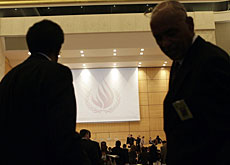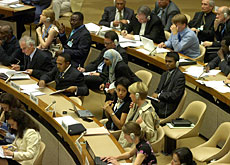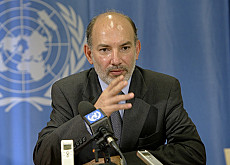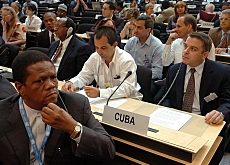Swiss accept trade-off at Human Rights Council

Switzerland says it welcomes an "acceptable compromise" reached on Tuesday at the new United Nations Human Rights Council in Geneva, but it expressed reservations.
The UN watchdog formally adopted a series of reforms to its future work, including how and when to launch investigations into some of the world’s worst rights offenders.
“The final document is a balanced text and is the result of concessions made by all of us,” commented Blaise Godet, Switzerland’s ambassador to the UN in the western Swiss city.
However, he regretted that the support of independent experts to “universal periodic reviews” – under which all countries will have their rights record examined regularly – was not in the final text.
He also said Switzerland had reservations about the code of conduct imposed on the special rapporteurs but said Bern had finally accepted it.
Cooperation
Ambassador Godet said he hoped the code would contribute to good cooperation between states and the rapporteurs, and asked for the experts to be left to get on with their jobs.
He added that he now wished council members to respond rapidly and effectively to human rights violations around the world.
“We have laid the foundations for the council. Switzerland will do all in its power so that it will be worthy of the men and women for whom it is there.”
The UN Human Rights Council – the result of a Swiss initiative – replaced the discredited UN Human Rights Commission a year ago.
Council members had negotiated in that time ground rules on the operation of the organisation over the next four years. Last-minute demands on Monday by China had threatened to torpedo the talks.
Chinese demands
China had demanded that approval by two-thirds of the council’s 47 members be required before an expert is appointed to investigate alleged rights violations in a country. The current requirement is a simple majority.
After 14 hours’ of talks, outgoing president Luis Alfonso de Alba of Mexico presented the meeting with an updated compromise.
This took into account China’s concerns by noting that resolutions against a country should have “the broadest possible support” – preferably they should be co-sponsored by at least 15 members – before being considered.
“We have all made compromises, it is not a perfect text. Negotiations never achieve a perfect text,” de Alba said in the early hours of Tuesday.
swissinfo with agencies
The council sat for the first time in Geneva from June 19-30, 2006.
The council meets at least three times a year for no less than ten weeks and can convene emergency sessions.
Its predecessor, the Human Rights Commission, met for just an annual six-week session.
Switzerland was elected to the council with a three-year mandate on May 9, 2006.
The council has 47 members.
Members of the UN Human Rights Council on Tuesday formally agreed to continue their scrutiny of Israel while halting investigations into Cuba and Belarus.
The move was criticised by both Canada and the United States.
The decision was part of a package of reforms adopted by the members of the Human Rights Council.
The European Union, which played a key role in the negotiations, said ahead of the meeting that it remained to be seen how the council could perform on the basis of the agreement.

In compliance with the JTI standards
More: SWI swissinfo.ch certified by the Journalism Trust Initiative



You can find an overview of ongoing debates with our journalists here. Please join us!
If you want to start a conversation about a topic raised in this article or want to report factual errors, email us at english@swissinfo.ch.